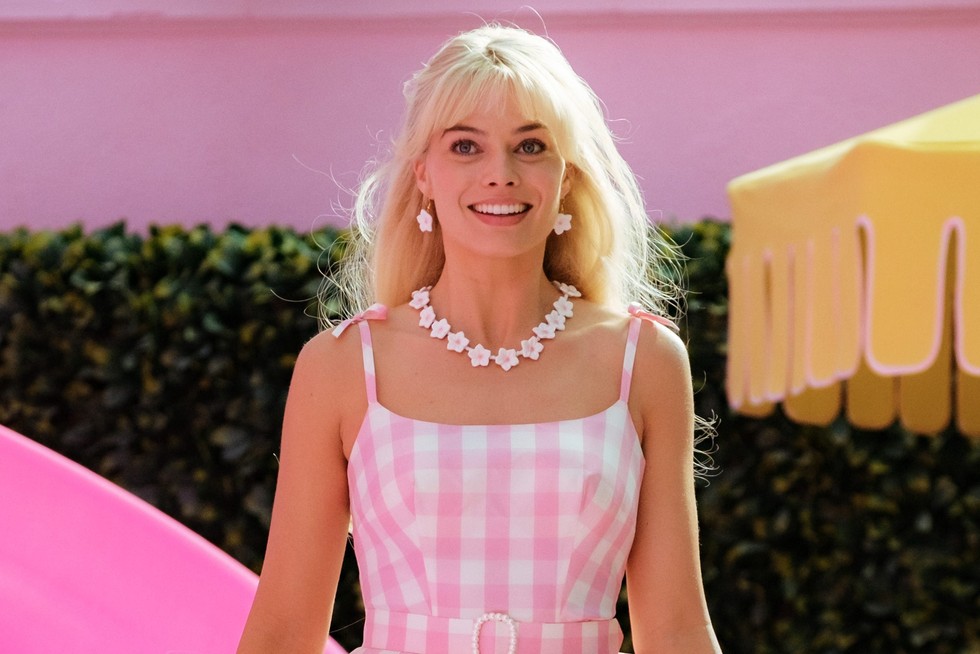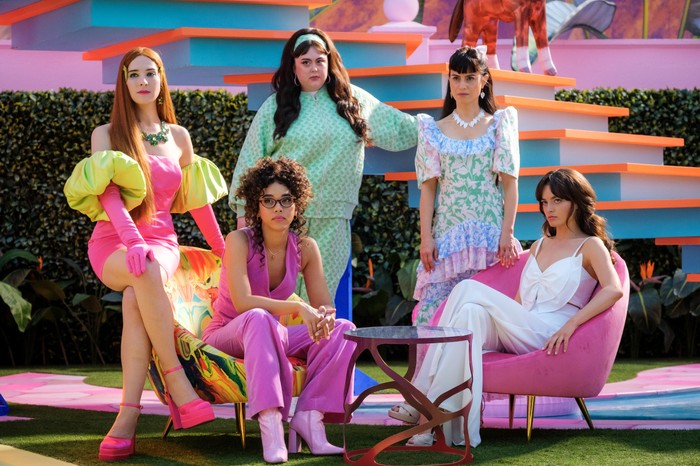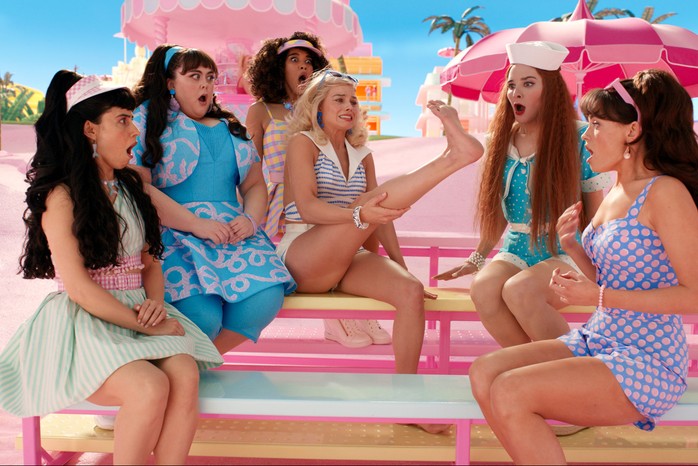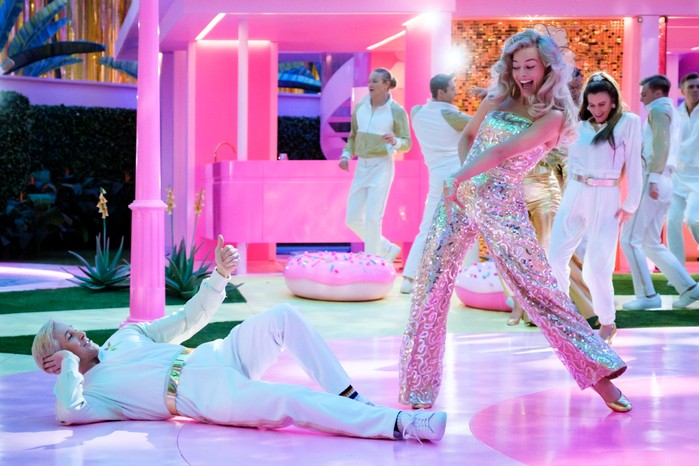Barbie is not just ‘white feminism’ – it's for everybody
Greta Gerwig's film has gone down a storm since its cinematic release – but hasn't escaped some criticism.

“Why on earth do adults have nothing better to do than to dress in pink and support a film about a doll who has made young girls feel insecure about themselves?” - a man with a megaphone condescendingly mansplained to a line of journalists queueing up to watch the press screening of Barbie.
The irony was completely lost on him that he, a fully grown man, had nothing better to do that evening than to stand in Leicester Square and harass the (mostly female) moviegoers, making them “feel insecure about themselves” for simply enjoying a film and doing their job.
This experience is just one spectacular reinforcement that we unfortunately do not live in the female utopia of Barbieland, but in the real world.
As Greta Gerwig rightly showcases in the film, ours is plagued with harassment, cat-calling and discrimination, performed mainly by entitled and uniformed men.
By entering your details, you are agreeing to our terms and conditions and privacy policy. You can unsubscribe at any time.
I only wish this man could have seen Gerwig’s cinematic masterpiece for himself, because it directly speaks to the concerns surrounding Mattel’s most popular doll.
Gerwig incorporated an anti-Barbie perspective through the teenage girl character of Sasha (America Ferrera’s on-screen daughter, played by Ariana Greenblatt) who, alongside friends Yasmin, Jade and Chloe (all named after the Bratz dolls), brutally digs into Margot Robbie’s stereotypical Barbie for being a symbol of “sexist” beauty standards, even going as far as to hilariously call her a “fascist”.
Although Mattel was initially hesitant with some of the scenes included in the film, Gerwig was right to address the controversies.
“If we don’t acknowledge certain things - if we don’t say it, someone else is going to say it. So you might as well be a part of that conversation,” Margot Robbie said to Mattel's president and CEO, Richard Dickson.
In doing so, Gerwig has the upper hand, because by being self-aware and making fun of the brand itself, it’s harder to criticise the film.
Yet one critique that keeps cropping up in marginalised communities is the notion that the film is allegedly a “white feminist” fantasy, instilling typical western beauty standards of being blonde and thin.

As a woman of colour myself, I was personally surprised by these responses, because my expectations for the film were very different. To me, it’s like going to watch the film Cars and being mad that there are - surprise, surprise - cars in it.
I’m all for diverse representation (I often campaign and write about it) but I do think there's no escaping featuring an eponymous, historical, stereotypical blonde Barbie in a film titled Barbie! After all, Margot Robbie’s appearance is exactly what you think of when you first think of 'Barbie' (and that’s on perfect casting).
More like this
But what was refreshing to see was Gerwig adding a new dimension to this iconic doll by demonstrating stereotypical Barbie’s privilege in comparison to the lived experiences of human women in the real world.
Furthermore, by making America Ferrera, a Latina woman of colour, do the educating on behalf of “white saviour” feminist Barbie, the film incorporates an intersectional lens of feminism, as Twitter user and TikTok influencer Maliha Fairooz rightly points out.
I think the fact that Gerwig chose to present this in the film is representative of an intersectional view of feminism - acknowledging the labour women of colour do on behalf of white feminists in the real world.
But there’s also a lot more to her character, as Ferrera explained in a recent interview with Gay Times: “The thing Greta didn’t have to do was write Gloria as a Latina woman.
"I think we often see ourselves represented in very gritty and rough stories about our struggles and our deportations and our rough lives, you know? But to get to be included in the fun, in the brightness, in the culture-making moments that are about joy is, to me, really special.”
This is not the first time Gerwig has been labelled a “white feminist” – her previous films Lady Bird and Little Women were also centred on white stories.
But naturally, as a white woman, Gerwig is likely to write stories based on her own experiences, and she may be wary of stepping outside those grounds to speak on behalf of minorities.
This is a view taken by journalist and aspiring filmmaker Rimsha Ali, who explains how she is “glad Greta didn’t write it on the voice of women of colour, because it allows giving space to other women to produce their own movies accordingly”.
In Gerwig’s defence, just because she happens to be ‘white’ and ‘feminist’ does not automatically or necessarily mean she is a “white feminist”. (I would recommend checking out Shahed Ezaydi’s and Koa Beck’s books on white feminism for more info.)

I could also argue that a diverse range of Barbies are represented in the film in terms of race, culture, size, and jobs, but I think it is important to recognise that representation goes beyond mere categories or checkboxes.
As a hijabi myself, it was heartwarming to see a “Hijarbie” minorly represented in the film, although it would have been nice if she had a voice along with some of the amazing women of colour leads including Issa Rae (President Barbie), Alexandra Shipp (Writer Barbie), and my personal favourite, Ritu Arya (Journalist Barbie).
Yet what really stood out to me more was not these token minorities, but instead how the heart and messages of the film were quite universal and relatable to any audience.
The same way it is possible to relate to animated non-human characters, I had no trouble resonating and empathising with Margot Robbie’s Barbie, despite not looking like her. The very real emotion and human representation transcends a lot of the hollow, superficial representation, in my opinion.
When I saw Barbie lying on the floor having an existential crisis, I felt seen. When Barbie cried while Billie Eilish’s song What Was I Made For? played beautifully in the background, I couldn’t help but shed a tear too.
And when I saw “Depresso Barbie” rewatching Pride & Prejudice (my favourite classic) for the 100th time, my bestie and I had to pause to look at each other in awe as we mouthed “that’s me” to the screen.
But the standout moment for me and a lot of viewers had to be when Ferrera gave her showstopper monologue, because it spoke directly to the pressures of womanhood and feeling the need to be extraordinary all the time.

All of this consolidates the message that anyone can be a Barbie, because Barbie is for all - even to the point of transcending the original creator’s idea.
What is also fascinating is that the blockbuster success of the film has perhaps even escaped Gerwig’s original intentions, with viewers analysing and perhaps reading too much into the film about the doll: It cannot avoid extreme readings, with some saying it’s “too woke” and others saying it’s “not woke enough”.
Yes, Greta Gerwig’s Barbie film is not perfect. Yes, it would have been nice to have more representation of the WOC Barbies. Yes, the feminism is a tad simplistic. But as critics have rightly pointed out, the Barbie film is not meant to be a “feminist manifesto”, but rather lighthearted entertainment at the end of the day, and it covers a lot of ground for what it achieves in an impressive 1hr 54 min runtime.
(Critic Zoë Rose Bryant also had an excellent theory on why the feminism in Barbie seems a little basic: because it was meant to mirror a child’s development.)
The film gave us a depiction of what life would look like under two gendered extremes - both a matriarchy in Barbieland, and a patriarchy in the real world.
One key takeaway message that emerges is that neither world is sustainable, and instead it implies a need for balance and equality between the sexes, and that's what makes it a feminist film - rather than 'anti-male'.
Giving her take on Barbie, journalist Furvah Shah told me: “Overall, I loved the film. I laughed, cried, felt seen and heard! I thought it was an affirming, celebratory representation of womanhood.
"While the monologue was touching and very relatable, it was somewhat surface-level. Yet, should we expect revolutionary feminist dialogue from a big-budget blockbuster like this?”
An interesting point emerges from all this exhausting discourse: Does every film about women have the pressure to be an all-encompassing empowering, feminist documentary? Perfect and extraordinary in the same way we expect women to uphold the impossible standards Ferrera outlines in her speech?
Why don’t we hold films made by men up to these same requirements? Why can’t we just enjoy a fun, silly, nostalgic film packaged in a pink wonderland? Isn’t that Kenough?
Read more
- Barbie movie cast: Full list of actors and characters
- Barbie review: A delightful, barmy, pink-blush comedy
Barbie is now showing in UK cinemas. Visit our Film hub for more news and features or find something to watch tonight with our TV Guide and Streaming Guide.
Try Radio Times magazine today and get 12 issues for only £1 with delivery to your home – subscribe now. For more from the biggest stars in TV, listen to The Radio Times Podcast.




